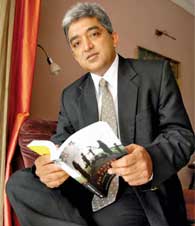Big fee
structures and very strait-jacketed 2 X
2 matrix oriented solutions have
spoilt the name of the big consultant
in the market.
And then there is everyone in big
space wanting to morph into
consulting. An audit firm wants to be
in consulting. As does a firm that
specializes in advisory services.
Further still, specialization has died
and generalization has replaced it all.
In the case of the small consulting
house, specialization has prevailed,
but the yen of the proprietor to widen
his horizon has been limited. There
has been an insecurity syndrome at
play as well, where the proprietor
wants to recruit people who must not
be better than himself. Further, small
houses find it difficult to get people to
work for them. Everyone wants to
work for the big. Add to that the fact
that many people who work for you
move on and start competing
businesses. The small consulting
outfit therefore keeps thinking small,
and gets pushed into a niche
business status that writes a selffulfilling
prophesy of eventual
closure.
The big need to learn from the small
and the small need to learn from the
big, if true-blue growth of the
industry is to be achieved.
-
Do you think there is a relationship
between retail consolidation in the
country and the existence of private
labels? Nirmalya Kumar (in Private
Label Strategy) said, "Private label is
not about developed or developing
world. Private label share is based on
the retail consolidation in the
country. If a country has high retail
consolidation then you have a high
private label share. If a country has a
low retail consolidation then you
have low private label share." Do you
agree with that proposition or is it not
the case with India?
India is different. Only 3.6% of our
16.4 million retail outlets are in the
Organized sector. “Small is beautiful”
is still a great and sustainable model
in this country. Private labels exist in
every small town. Go to Erode and
you will find small-store private label
grain, sugar, masalas, and more. You
will find private labels in Peddapalli
just as you will find private labels in
Hoshiarpur.
Within organized retail in India, the
private label growth is slow and is
likely to remain so. Aditya Birla retail
is the fast-tracker in this segmentwith
a whole host of ‘More’ products on
the shelves. Expect these tomove into
the mass market as well, sooner than
later.
-
Let's for a moment look at the
Indian retail industry. Many new
players have entered the industry
with new brands, formats, and new
value propositions. Investments were
made into creating cavernous
shopping spaces driving up the real
estate prices. New malls have come
up across the country. And suddenly
there seems a lull. Is it a lull before the
storm or is it that storm isn’t there for
sure?
I do believe that the Indian retail
industry and its partners, the realestate
industry has invested in
putting together the infrastructure for
modern organized retail in a big way.
We have a total of 223 malls on paper
by 2010. Many are of course stuck as
of now with the lack of funds.
I do believe there has been a herd
mentality in such mall investments.
This will be a pain-point in the short
term, but will pay off in the long run.
If India witnesses a 4-5.8% GDP
growth rate for the next three years
running, I do believe we will get out
of the woods soon. Remember, we
along with China will be the only 2
growing markets in the face of
international recession all around.
We are an important market not only
for Indians but global folks all
around. Our growth stands out like a
sore thumb to many.
We Indians are an innovative and
resilient lot. Our businesses will
adjust to the current down-turn and
its onslaught on ongoing mall
projects.
